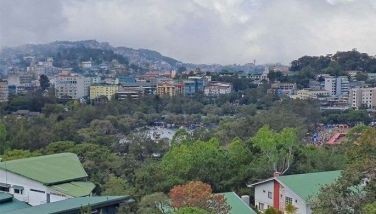Marcos: HR funds not our concern
MANILA, Philippines - As far as the Marcoses are concerned, they are no longer interested in the funds confiscated from them by the government, which can now use the money for whatever purpose it sees fit.
This was the reaction of Sen. Ferdinand Marcos Jr. to the ratification by Congress of the bill that would compensate human rights victims during the regime of his father and namesake.
“As I keep explaining, this is an issue between the human rights claimants and the government. It involved the Marcos family and my father’s estate but it is no longer the case,†Marcos told Senate reporters Senate yesterday.
“It has nothing to do with us at this point anymore because the judgments have been made against us and our position has been very clear: the government has confiscated the assets so it’up to the government to now dispose of them as they see fit,â€he added.
The Senate and the House of Representatives ratified the bicameral conference committee report on the human rights compensation bill on Monday, paving the way for President Aquino’signing it into law.
A total of P10 billion, excluding interest earned, which was part of the $625 million recovered by the government from the Swiss bank accounts of the Marcoses in 2004, was set aside for the compensation of victims of human rights violations during the Marcos regime.
The balance of the recovered funds would be used for the Comprehensive Agrarian Reform Program (CARP) as mandated by law.
Under the bill, a Human Rights Claim Board would be created to go over the claims of the various human rights victims.
The bill provides all claimants in the class suit and direct action plaintiffs in Hawaii, and all victims recognized by the Bantayog ng mga Bayani Foundation on the same conclusive presumption that they are all human rights victims.
Marcos said he has inhibited himself from the issue a long time ago, saying he could never be objective about it.
Marcos said he has no idea if the money would be put to good use and he would leave it up to the government and the claimants to settle.
For Vice President Jejomar Binay, the compensation for human rights victims is long overdue.
“It was about time that they were given justice. It is long overdue and I’glad that it was passed under the administration of President Aquino,â€said Binay, a human rights lawyer who was detained shortly after the late strongman Marcos declared martial law in September 1972.
Binay said the bills’passage showed the common commitment of the government to uphold human rights.
“For those of us who were jailed during martial law, and for those who were tortured and subjected to indignities, it’not about the actual compensation but the recognition that the rights of an individual were violated by a regime,â€he said.
Half a million each
Bayan Muna Rep. Neri Colmenares said thousands of human rights victims will receive as much as P500,000 each once the bill is signed into law.
“It is beyond compensation but reparation and recognition for the human rights victims during martial law. It is not a big sum of money now but this will be a big help to the victims who are now old,†Colmenares told dzMM radio.
Colmenares noted the bill seeks to grant reparation and/or recognition to the victims during the regime of Marcos covering the period from Sept. 21, 1972 to Feb. 25, 1986.
The claimants who successfully secured a final and executory judgment in the US Federal District Court of Honolulu are accorded conclusive presumption as victims claimants even as the Human Rights Victims’ Claims Board has the inherent power to determine the extent of the human rights violations and the amount of reparation which may be granted to each claimant.
The victimss recognized by the Bantayog ng mga Bayani Foundation are also entitled to conclusive presumption.
Principal funding shall come from the P10 billion, plus accrued interests, which is part of the funds transferred to the government of the Philippines on Dec. 10, 1997 by the Swiss Federal Supreme Court and forfeited in favor of the Philippine government as Marcos ill-gotten wealth by the Philippine Supreme Court on July 15, 2003.
Colmenares said there will be two groups of claimants for compensation: first, the group composed of 9,539 victims who won in the Hawaii class action suit against the Marcoses, and second, the individuals not included in the suit.
Colmenares said claimants will be screened using a point system to determine the amount that each victim or their kin will receive, with those tortured or killed getting a higher compensation than those harassed or economically disadvantaged.
The board will have only two years to finish the compensation process, he said.
Would still claim
The human rights group Selda (Samahan ng Ex-Detainees Laban sa Detensyon at Aresto) said they would still pursue the settlement of their claim even if they get compensated under the compensation bill.
Selda chairman Marie Hilao-Enriquez said members of the class of almost 10,000 human rights victims that were awarded $2 billion in compensatory damages by a US Hawaii district court in 1992 would still seek compensation under the new law.
Enriquez criticized Presidential Commission on Good Government (PCGG) chairman Andres Bautista for saying the members of the class should give up their claim under the $2-billion award if they get compensation under the new law.
“We are exasperated, disappointed and angry at such malicious and irresponsible statements made by PCGG chair Andres Bautista. Why should we give up the claims when the award is based on the judgment that the Marcos dictatorship is guilty of crimes against humanity, and therefore the Marcoses are accountable for the human rights violations committed under their reign?â€Enriquez said.
Enriquez pointed out the Hawaii court judgment was final and executory. – Paolo Romero, Rainier Allan Ronda, Jose Rodel Clapano
- Latest
- Trending


























